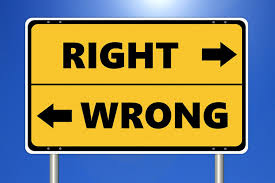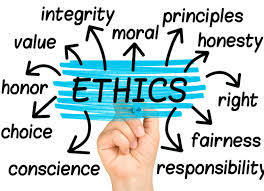in Smooth Functioning of Public Service
Basic principles of ethics can help us lead a more fulfilling life whether on a personal or professional level.
Workplace pressures may cause us to react in a way that is inconsistent with our values.
Our values are important because they help us to grow and develop.
Values relate to the norms of a culture, but they are more universal and abstract than norms.
When we use our values to make decisions, we make a deliberate choice to focus on what is important to us.

When values are shared, they build internal cohesion in a group.
Ethics is a system of principles that helps us tell right from wrong, good from bad.
Ethics can give real and practical guidance to our lives.
Ethics embodies honesty, accountability, integrity, empathy and just knowing the difference between what is right and what is wrong.
At every level of public administration, in all non-profits and government organizations, ethical challenges are present.
Ethics and values have key role in smooth functioning of public administration system.
Ethics in public service is a crucial part of the day-to-day activities that public administrators make. There is absolutely no room for anything other than operating with full transparency.
Ethics provide accountability between the public and the administration.
Following to a code of ethics warrants that the public receives what it needs in a fair manner.
It also gives the administration guidelines for integrity in their operations. That integrity, in turn, helps foster the trust of the community.
By creating this atmosphere of trust, the administration helps the public understand that they are working with their best interests in mind.
When analysing ethics and values with regard to public administration, it can be said that ethics is about determining what is ‘wrong’, ‘good’, ‘bad’ or ‘right’, and ethical choices are informed by values which help actors decide on what option to take when faced with an ethical dilemma (Kakabadse et al 2003, p.478).
Civil servants are servants of the public, of government, of their immediate organisations and of the law.
Civil services officers have vital role to implement public policy and should understand the significance of values to all aspects of their work.
Duties of the public servant remain many, complex and often apparently conflicting, but successful civil servants recognise their multiple roles and prepare for them. These include maintaining secrecy, acting in the public interest, regulating, providing quality advice, adjudicating, avoiding conflicts of interest, guaranteeing accountability to a range of actors and treating all colleagues equitably.
Uncertainty about values can not only lead to ethical and decision-making problems, but also affects organisational coherence by lessening team spirit, creating organisational confusion and weak external communication. Public administrators are responsible not only for understanding the values understood in the decisions they take, but also for articulating those values clearly for others in the organisation and for external customers.






